Sat 8 Jul 2023
A Movie Review by David Vineyard: SHORT CUT TO HELL (1957).
Posted by Steve under Crime Films , Reviews[4] Comments
SHORT CUT TO HELL. Paramount Pictures, 1957. Robert Ivers, Georgann Johnson (debut of both), William Bishop, Jacques Aubuchon, Murvyn Vye. Screenplay by Ted Berkman and Rafael Blau, based on the screenplay by W. R. Burnett for This Gun For Hire (1942) and the novel A Gun for Sale by Graham Greene. Directed by James Cagney.
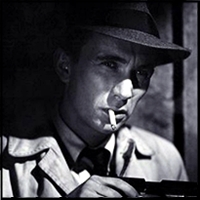
With apologies to film critic Bosley Crowther, Short Cut to Hell certainly is.
James Cagney’s debut as a director, and his only film as one, is a mess by any measure, not the least the absolute failure of this two stars making their less than stellar debut in two of the least charismatic screen performances imaginable.
Watching this it is hard to believe the legendary Cagney who worked with some of the finest directors in Hollywood like Wellman, Walsh, and Curtiz, could have picked up so little or produced so pedestrian a film, pedestrian being a compliment because this often looks like a bad half hour episodic television cop show of the era.
Whatever Graham Greene thought of the original 1942 version of his novel A Gun for Sale, filmed under its American title This Gun For Hire, there was no denying the extraordinary appeal of its cast: Alan Ladd as the emotionally and physically scarred gun man Raven, Veronica Lake as Ellen, a sexy smart young singer/magician caught up in Raven’s mission, Laird Cregar as the effete double crossing club owner who hires Raven and then betrays him, and Robert Preston as Ellen’s policeman boy friend.
In that version, the plot moved from London to LA, and Raven changed from a man scarred by a cleft lip to one with a twisted wrist, Raven kills to cover up a crime for Cregar’s character who then betrays him to the police. Raven escapes swearing revenge on Cregar and whoever employs him, runs into nightclub performer Ellen on the way to LA for a job and ends up taking her hostage as she awakens his long buried humanity and sense of decency. Meanwhile Ellen’s boyfriend Robert Preston is the policeman hunting Raven, especially once he discovers Ellen is his hostage.
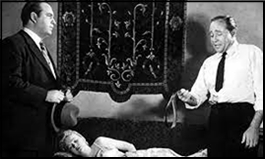
That film made iconic stars of Ladd and Lake, who went on to be teamed in multiple films and was a major success for the studio.
Not so much Short Cut to Hell.
Here we meet Kyle (Robert Iver, changed from Raven and chosen because Chad seemed too tough sounding, I assume) who lives in a rundown hotel with his cat who he obsesses over while violently spurning the advances of the daughter of the manager (Yvette Vickers) who is attracted to and repelled by the slender slight killer.
Kyle cold bloodedly assassinates a young engineer and his secretary who threaten to reveal a crime by his employers and meets effete Jacques Aubuchon at a small restaurant to be paid, not knowing Aubuchon plans to claim the sequential bills he has paid Kyle were stolen from him, and knowing Kyle let him shoot it out with the cops and die.
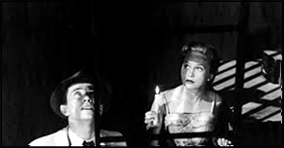
Enter policeman William Bishop assigned to the case, whose performer girlfriend Glory (Georgann Johnson) is leaving for LA to work in a club rather than marry him.
Kyle escapes and Kyle, Aubuchon, and Glory all end up on the train to LA where Kyle takes Glory hostage.
From there the film pretty much follows the Greene novel and the 1942 film in terms of plot, but only in terms of plot.
Otherwise it bears the same relationship to the classic film that Abbot and Costello Meet Dr. Jekyll and Mr. Hyde bears to the Oscar winning Frederic March version directed by Rudolph Mate.
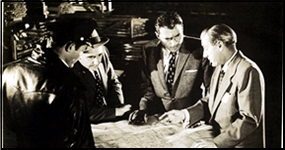
Let’s start with Ivers, a wanna be James Dean type with the charisma and screen presence of unbuttered toast. Perhaps he did better in later performances, but I see no evidence of that here. What is supposed to be a smoldering killer with budding humanity beneath the ice cold mask instead looks slightly petulant and somewhat constipated as if his chewing gum lost its flavor.
I have seldom seen a worst performance in a film from a major studio, or a less compelling one. Compared to Ivers, Alan Ladd was Olivier.
Our other debut Georgann Johnson as Glory isn’t much better though somewhat more animated and certainly better to look at. Without the teasing peek a boo mix of playful sensuality and smoky sexuality that Lake exuded, the character of Glory just doesn’t make much sense. There is no reason for her to feel anything but fear of Iver’s Kyle, so her protection of him and aid seem perverse and a bit stupid. Minus the visible sparks that flowed on screen between Ladd and Lake, the plot doesn’t make much sense without Greene’s novelist voice to carry us through.
No one else fares much better. William Bishop was always better cast as charming bad guys, and Jacques Aubuchon has the unenviable task of following Laird Cregar in the role of the cowardly immoral and effete bad guy , and frankly rather than a sense of menace and vague depravity, he only communicates dyspepsia and the snobbery of a punctilious head waiter at a second rate French restaurant.
Murvyn Vye appears as Aubuchon’s sadistic chauffeur in a noirish touch, but it is so blatant and so flat that it comes across as unintended humor rather than noir. Unintended humor is pretty much the definition of this film that is often laughably off key, thanks to the performers and script.
One dramatic scene where Kyle kills a cat to keep it from revealing his hiding place is supposed to be played for his horror and anguish at what he has done, but plays more like a Monty Python sketch gone horribly wrong.
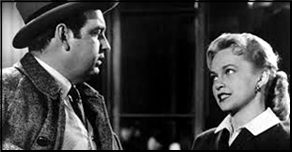
Painful as it is to write, James Cagney comes in for his full blame for this as well. His direction is unimaginative and pedestrian. He disdains any use of light and shadow beyond the simplest of shots, his camera is objective and cold, mostly in two shots and long shots even when extreme closeups would seem unavoidable, and he shows no sense of pace or suspense much less cinematic flair unfolding his story as static as episodic television at its most unimaginative.
It is not surprising a man of his taste didn’t venture into the director’s chair again after this. I applaud his recognition of his limits.
Short Cut to Hell was remade in 1979 as made for TV movie with Robert Wagner and Lou Antonio. I only hope it was better than this.
There is a language of film, and it is always disappointing when someone you expect to know it intimately proves deaf to its rhythms and lyric style. This film is actively bad, perhaps not a bomb, but empty and devoid of any sense of style. It isn’t Ed Wood, and I am not suggesting that, but the combination of James Cagney, Graham Greene, W. R. Burnett, and a classic film should have been more than this.
It is currently on YouTube, and I can only say if your curiosity overcomes you, watch at your own peril.
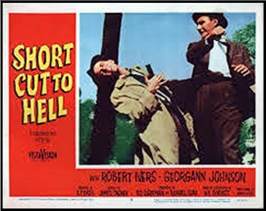
July 8th, 2023 at 10:17 pm
A fascinating review, David, principally because you anticipate something viable from Cagney, I did not and do not, and as the film was produced by A.C. Lyles, a lovely guy who had been at Paramount in publicity for years, I anticipated nothing. And got it. A. C. was the father of roughly a dozen two-week westerns in the mid-sixties, all of which featured tired stars.Rory Calhoun, Virginia Mayo, and Scott Brady, supported by less viable names. Dana Andrews headlined one, but he was recovering from alcoholism and out to prove something.
Back to Cagney, I do not think much of him as a producer either, a good actor playing nasty little people, or sentimental Irishemn under the direction of Michael Curtiz.
July 9th, 2023 at 5:01 am
Found another slant on this here:
https://mysteryfile.com/blog/?p=1192
I understand Cagney did this as a favor to his friend Lyles, which might account for the perfunctory feel of the thing.
As for Lyles, I think his heart was in the right place, but his aesthetic discernment was in his wallet. At a recent Movie Convention, I saw a poster for JOHNNY RENO (1966) and reflected that 20 years earlier, a film headlined by Jane Russell and Dana Andrews would have been a “A” feature, instead of being doled out to the bottom of double-bills — Sic transit gloria movies.
July 9th, 2023 at 6:54 pm
I’ve seen the Robert Wagner TV movie version of the story and would be proud to recommend it to anyone. It’s set in New Orleans; filmed in color.
But, I affirm its charms strictly on the basis of my own enjoyment. I’ve already confessed myself very tolerant when it comes to stars I enjoy. I can’t always defend the performances which please me.
But Wagner truly seemed to thrive in the ‘Raven’ role. He was icy and wistful; and delivered lines with control and restraint.
One scene has him running through a cemetery, gun in hand, cops on his heels. Headed towards a no-win skyscraper showdown with an aggressive SWAT team.
Was that Lou Antonio also in the cast? Lou Antonio, from ‘Cool Hand Luke’? He made no impression on me.
But the girl filling Veronica’s patent-leather pumps was actually, marvelous. A buxom girl-next-door type with the unlikely name of Nancy Everhard, I recall (without even checking).
Oh well. I understand that young Wagner himself was a big fan of Ladd and had a hard time separating himself from Ladd’s style when he ‘arrived’ in Hollywood. It was a lot of fun seeing him pay an homage to the guiding star of his early career.
July 10th, 2023 at 5:48 pm
Lazy, I had heard good things about the Wagner version, but have never seen it. IMDb lists it as Lou Antonio in the thing.
Barry, I agree about Cagney the producer, but I expected just sitting around the set he would have picked up something from the likes of Curtiz, Walsh, and Wellman.
I didn’t touch on Lyles because directors have overcome low budgets and even mediocre actors and I hoped Cagney would take the opportunity to be a bit more ambitious. A trailer in which Cagney praises Ivers performance as a new star is just pitiful considering how truly bad he is (though someone on IMDb thought he was better than Ladd inevitably).
Workman like actor turned directors like Don Taylor and Gene Nelson seemed to have absorbed more from the films they did than Cagney here.
Like him or not, I did, Cagney was in some of the most visually stunning films of his era from PUBLIC ENEMY to WHITE HEAT. He worked with top directors eventually even Billy Wilder, even tossing this off to do a favor if he had just copied shots from the original, he would have done better.
Cagney gives the impression that Ivers was his discovery in the trailer, but I’m guessing that isn’t true (he did much better with Audie Murphy).
I blame Cagney here because he had the name and the influence to have tried something even if he failed with this project, and ultimately the real sin of this film isn’t trying and failing, but not trying at all. Tourneur made a masterpiece out of the low budget in OUT OF THE PAST, shooting in the dark because he couldn’t afford better sets and lighting.
Short of ill health or a scheduling conflict there is no real reason Cagney should get a pass for dumping such a bad film on the public with his name on it.